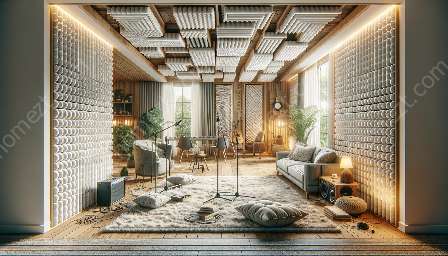When it comes to creating a peaceful and quiet environment at home, acoustic panels and soundproofing walls play a crucial role. These solutions can greatly enhance noise control in homes, improving the overall acoustic experience.
Understanding Acoustic Panels
Acoustic panels are specialized sound-absorbing panels that are designed to reduce noise levels and improve sound quality within a space. They are commonly used in home theaters, recording studios, and living areas to minimize echo and reverberation, creating a more pleasant listening environment.
Acoustic panels are typically made from materials such as foam, fabric, or wood, and they come in a variety of shapes, sizes, and designs to suit different aesthetic preferences and acoustic requirements.
Benefits of Acoustic Panels
One of the key benefits of acoustic panels is their ability to enhance the acoustic performance of a room. By absorbing and diffusing sound waves, these panels can reduce unwanted noise, improve speech intelligibility, and create a more balanced sound environment.
Additionally, acoustic panels can also contribute to the overall aesthetic appeal of a room. With a wide range of colors and designs available, they can be customized to complement the decor while serving a functional purpose.
Soundproofing Walls and Ceilings
Soundproofing walls and ceilings in homes is essential for minimizing the transfer of sound between different rooms and from external sources. This is particularly important for creating a peaceful and comfortable living environment, especially in urban areas or homes with high noise levels.
There are various soundproofing solutions available, including adding extra insulation, using resilient channels, installing soundproof drywall, and applying acoustic treatments to the ceiling. Each of these methods can contribute to reducing noise transmission and improving overall sound control within the home.
Best Practices for Soundproofing Walls and Ceilings
When soundproofing walls and ceilings in homes, it is important to consider several factors, including the construction of the building, the existing noise sources, and the desired level of sound control. Proper insulation, acoustically-rated materials, and strategic placement of soundproofing elements are essential for achieving optimal results.
Consulting with a professional acoustical consultant or contractor can provide valuable insights and guidance on the most effective soundproofing solutions for a specific home environment.
Noise Control in Homes
Overall, effective noise control in homes involves a combination of acoustic panels, soundproofing walls, and other sound management techniques. By addressing both sound absorption and sound transmission, homeowners can create a more tranquil and enjoyable living space, free from unwanted disturbances.
From enhancing the acoustic performance of home entertainment spaces to creating peaceful sleeping environments, acoustic panels and soundproofing walls are valuable tools for improving the overall quality of life at home.






